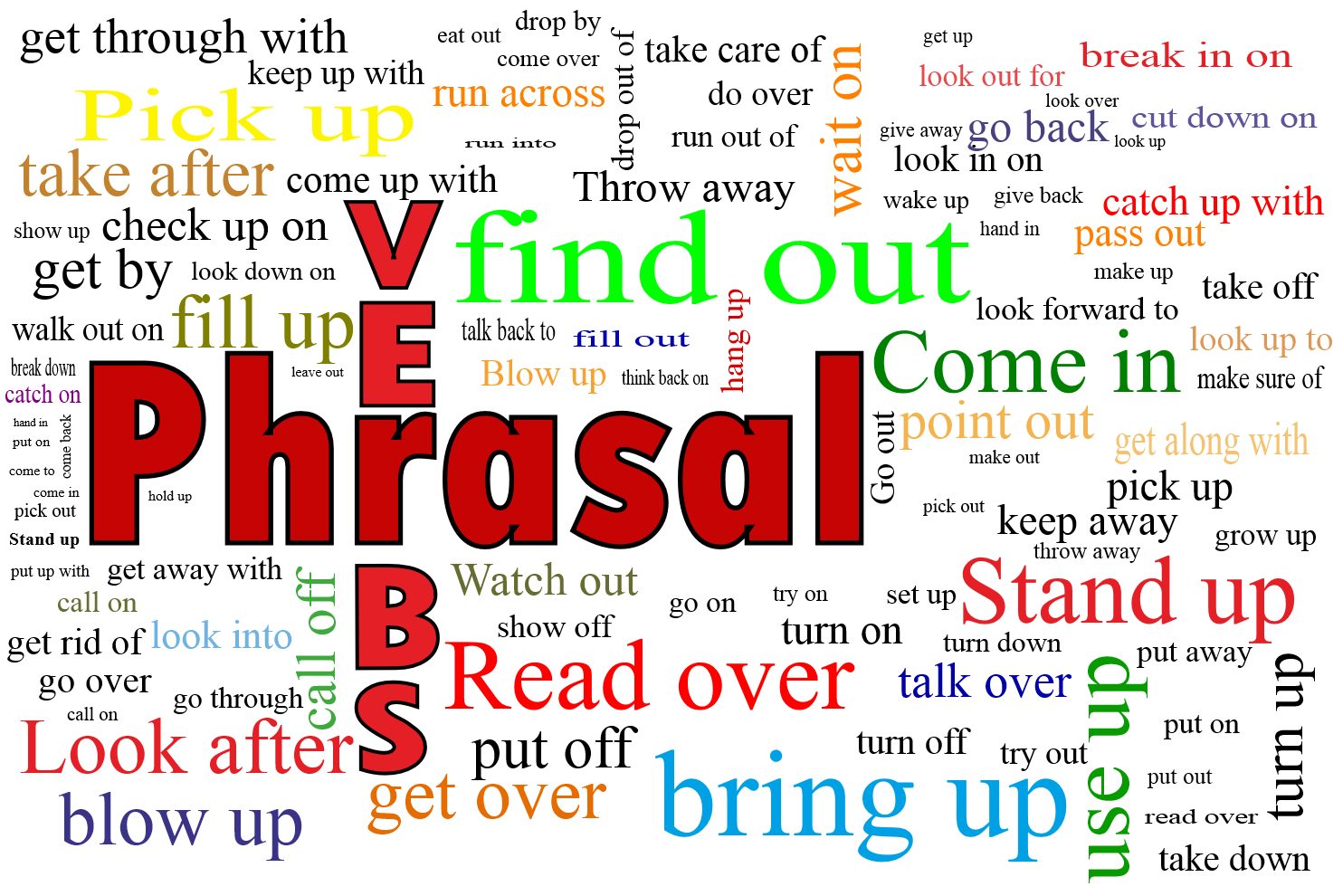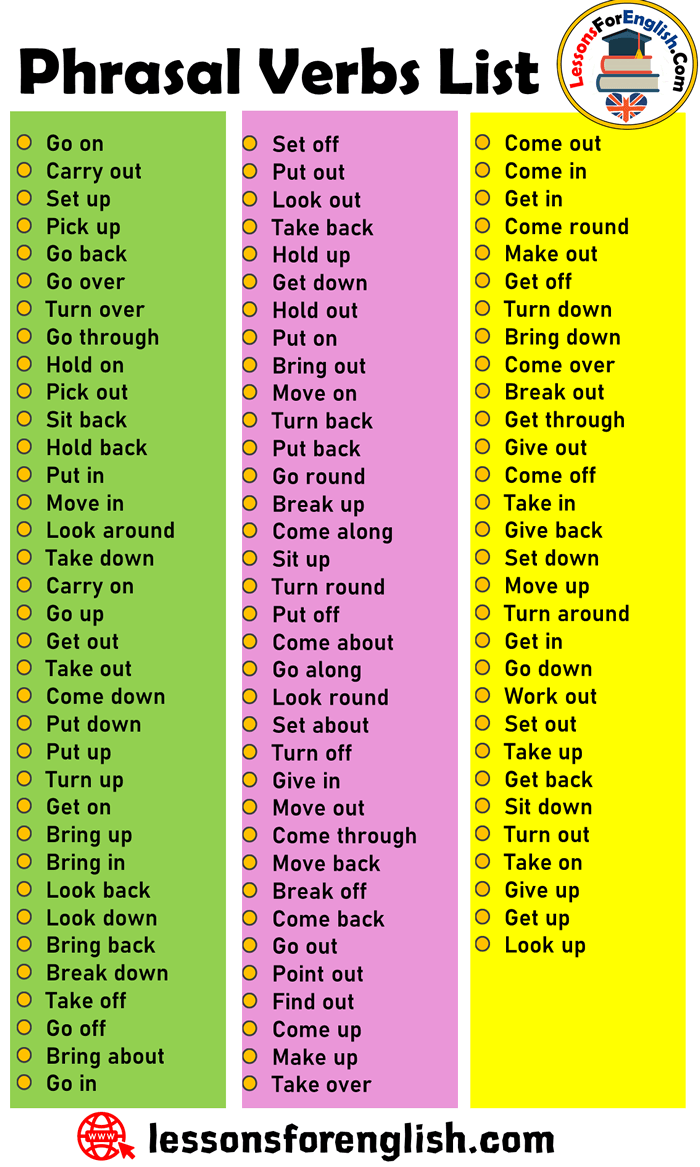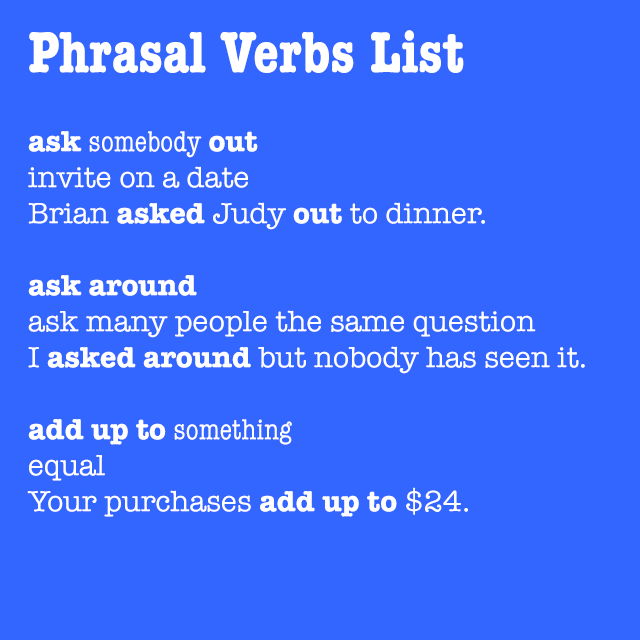

Phrasal verbs are an important part of English for you to study and become familiar with. Put off – Postpone – “If everyone is sick we’d better put off the meeting.” Make up – Invent – “Is that really true or are you making it up?” Look after – Take care of people or things – “Can you look after the kids while I do the shopping?”įind out – Discover information – “She’s just found out that she got the job!” Look forward to – Be happy and excited about a future event – “We’re really looking forward to our holiday.” Log out – Exit a computer or website – “After your lesson, log out so your information remains private.” Log in – Enter a computer or website – “After you log in you can access the data.” Pick up – Collect someone – “My Mum picks me up after school.”
#A LIST OF PHRASAL VERBS FULL#
Take off – Remove clothing – “She’d just cleaned so she asked me to take my shoes off.”įill up – Make something full – “Let’s fill up with petrol before we leave.”įill in – Complete with information – “I have to fill in this form to apply for a passport.”ĭrop off – Leave someone or something – “My Dad drops me off in front of my school every day.” Put on – Put clothing on your body – “If you’re going out, put a coat on.” Turn down – Decrease the volume or power – “Please turn down that music. Turn up – Increase the volume or power – “Can you turn up the radio? I can’t hear it.” Turn (switch) off – Remove power from an electrical device – “Remember to turn the lights off when you leave.”
#A LIST OF PHRASAL VERBS TV#
Turn (switch) on – Give power to an electrical device – “Turn on the TV so we can watch the news.” Get up – Leave a bed or chair – “He gets up at 6:45 a.m.” Wake up – Stop sleeping – “I woke up late this morning.” Here are the most common ones with their meanings and an example: There are several phrasal verbs that you probably already know and that are used daily. However, in formal writing, it’s best to avoid phrasal verbs and use more formal, traditional verbs. Native speakers use phrasal verbs a lot in speech and in informal writing.

And you learn them naturally through listening and speaking. Try to use an English monolingual dictionary so you read the definition and synonyms in English.Īt Wall Street English you learn phrasal verbs gradually throughout the course. Try to understand the meaning from the context, then if you still don’t understand, look it up in the dictionary. When you come across (find or meet) a new phrasal verb, pay particular attention to it. You need to consider them like any other verb that needs to be learnt. There are hundreds of phrasal verbs so you obviously can’t learn them all together like a list of vocabulary. What’s the best way to learn phrasal verbs? The clients can’t come to the meeting so we’d better call it off. When I need to use a pronoun instead of a noun, I have to put the pronoun in the middle. When a phrasal verb is transitive we can usually put the noun between the main verb and the adverb/preposition. Other phrasal verbs have objects, meaning they are transitive. Our car broke down three times last month. In this case you can use them like any other verb. Some phrasal verbs are intransitive, meaning they don’t have an object. Transitive and intransitive phrasal verbs Take after = be similar to a parent or relative The difficult thing about many phrasal verbs is that they often have a meaning that’s quite different to the original meaning of the verb. For example, Take off your jacket is quite easy to understand. For learners that can be harder, even if you can often guess the correct meaning. Native speakers obviously understand which meaning is being used according to the context.

They take off $50 from the original price. Take off has several meanings, including: Many phrasal verbs unfortunately have more than one meaning, like a lot of verbs. The first word is a verb and the second (and third) is an adverb or preposition.

What are they, and how can you learn them? What is a phrasal verb?Ī phrasal verb is a verb that has two or sometimes three words. The English language has quite a few strange characteristics, and one of the most confusing for many ESL learners is phrasal verbs.


 0 kommentar(er)
0 kommentar(er)
